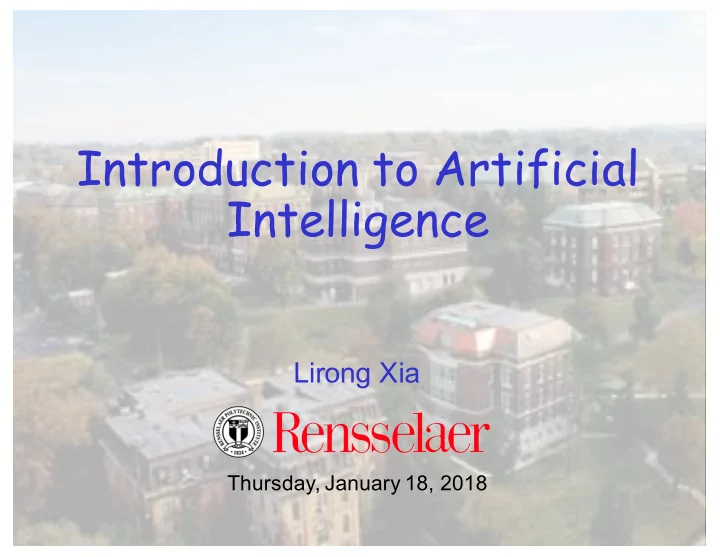

Introduction to Artificial Intelligence Lirong Xia Thursday, January 18, 2018
Basic information about course Ø Mon Thur 2:00-3:50pm, EATON 214 Ø Text: Artificial Intelligence: A Modern Approach Ø Course website: google “Lirong Xia” and follow the link Ø Instructor: Lirong Xia • TBD, Lally 306 Ø TA 1: Chunheng Jiang Ø TA 2: Avi Weinstock
Prerequisites and Policy Ø Comfortable programming in Python 2 Ø Some knowledge of algorithms • Must have taken Intro to Algorithms Ø Familiar with probability • Must have taken FOCS Ø If you have a nonstandard computer science background, talk to me first Ø No electronics in classroom except for polling
Grading Ø Exam 1: 30% Ø Exam 2: 30% Ø Projects: 25% • must do it yourself, must acknowledge discussions Ø Written Homeworks: 15% • must do it yourself, must acknowledge discussions Ø Bonus • 1% for in-class signup Ø Late policy • official excuses are allowed • otherwise, 3 tokens, each for 24 hours, only 1 is allowed for each case • otherwise no partial credit 4
Goal of the course Ø Learn about Artificial Intelligence • Increase your AI Literacy • Prepare you for Topics Courses and/or Research Ø Breadth over Depth 5
Goal of today Ø What is AI? Ø AI history Ø State of the art Ø A walk through the syllabus 6
What is AI? 7
Science and Engineering Ø Humans have achieved many wonders in the physical world. Ø How about in the spiritual world? Ø AI is one of the great intellectual adventures of the 20th and 21st centuries. • What is a mind? • How can a physical object have a mind? Is a running computer (just) a physical object? • Can we build a mind? • Can trying to build one teaches us what a mind is? 8
Some State-of-the-Art AI Ø iRobot Roomba automated vacuum cleaner Ø Automated speech/language systems Ø Spam filters using machine learning Ø Usable machine translation through Google Ø Watson wins at Jeopardy Ø Deep Blue beats Kasparov Ø AlphaGo 9
Other Good AI Challenges Trading agents Autonomous vehicles Socially assistive robots 10
Challenges Drive Research Vision L earning Robotics Natural …… Language Game Multiagent Distributed Knowledge 11 Theory Reasoning Optimization Representation
Learning and Multiagent Reasoning Vision L earning Robotics Natural …… Language Game Multiagent Distributed Knowledge 12 Theory Reasoning Optimization Representation
Ethics/Implications Robust, fully autonomous agents in the real world What happens when we achieve this goal ? ? 13
A Walk through the Schedule Official schedule is online 14
Topics Ø Search • Project 1: Pacman search dots in a maze Ø Game playing • Project 2: Avoid the ghosts Ø Probability, decision theory, reasoning under uncertainty • Project 4: Ghostbuster Ø Machine learning • Reinforcement learning (Project 3) • Classification: recognizing handwritten digits (Project 5) Ø Other topics • Planning: finding a schedule that will allow you to graduate (reasoning backwards from the goal) • Game theory
The Pacman projects Ø Use python 2.7, not 3.0 Ø 0: python tutorial (1 week, due 1-24 11:59pm) Ø 1 : search in the maze (2 weeks) Ø 2: avoid the ghost (2 weeks) • python pacman.py • python pacman.py -p ReflexAgent -l testClassic Ø 3. reinforcement learning (2 weeks) • the technique behind AlphaGo Ø 4. ghostbusters (2 weeks) • python busters.py -l bigHunt Ø 5. classification (2 weeks) Ø Late policy: 3 tokens, each for 24 hours 16
Assignments Ø Join Piazza for discussions, Q/A, etc Ø First “programming” assignment • Project 0: Tutorial of Python • Due date: 1-25 11:59 pm • Use Submitty for submission § Submission instructions will be available soon 17
Acknowledgements Ø The slides are based on • Pieter Abbeel and Dan Klein’s AI course at UC Berkeley • Vincent Conitzer’s AI course at Duke • Peter Stone’s AI course at UT Austion Ø Project assignments • The Pac-man projects (John DeNero, Dan Klein, Pieter Abbeel, and many others) 18
Recommend
More recommend